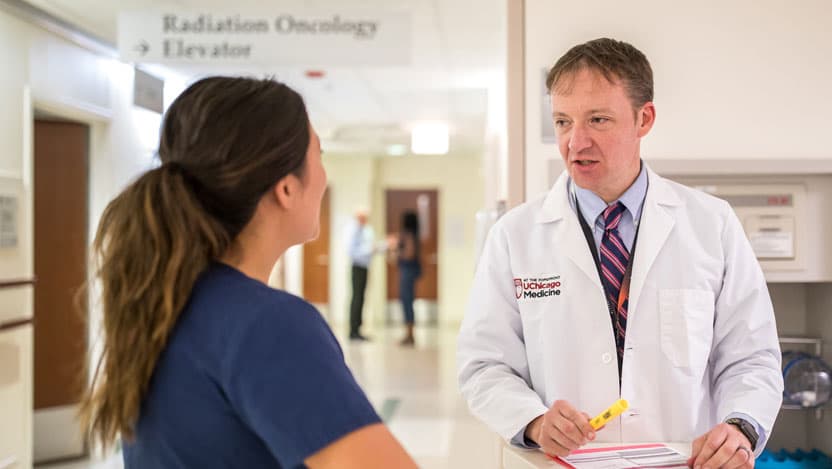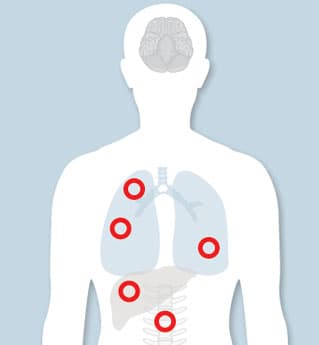Radiation Therapy for Lung Cancer

Radiation therapy can help people with lung cancer live longer, better lives, especially when it is combined with other treatments. Breakthroughs in radiation therapy available at the University of Chicago Medicine have made this treatment safer, more effective and more convenient than ever for lung cancer patients. For example:
- Four-dimensional computer programs allow doctors to create a highly detailed, “map” of the lungs that allows them to deliver radiation with a high degree of accuracy.
- A technology called image-guided radiotherapy gives doctors a “real time” picture of a tumor’s response to radiation, so they can adjust the treatment if needed.
- An advanced radiation treatment called stereotactic body radiotherapy (SBRT) shortens treatment time. Unlike daily doses of traditional radiation spread out over several weeks, SBRT requires only one to five treatments.
Hope for Difficult Cases of Lung Cancer
Our lung cancer team at UChicago Medicine takes a more aggressive approach to using radiation to treat stage 4 lung cancer. Even if you have been turned down for radiation therapy at other hospitals, we may be able to design a treatment plan to help you live longer and improve your quality of life.
We offer several clinical trials for stage 4 lung cancer using radiation therapy combined with chemotherapy and immunotherapy. Our expert team is also developing new ways to treat multiple lung tumors at the same time. In addition, we may provide some hope if you have been told your tumor is too large for radiation, because our team has expertise in partial tumor irradiation for large lung cancer tumors.
If you have already had radiation for lung cancer and were told that you cannot receive it again because of scar tissue, we may be able to help. Our radiation oncologists are highly skilled in reirradiation (repeat radiation therapy) and can discuss which options might work for you.
Radiation Consultations Within 48 Hours
We understand that waiting to see a doctor when you have lung cancer is stressful. We make every effort to have a radiation oncologist see you within 48 hours of your call, so you can understand your options and get answers.
When you are ready to receive radiation therapy, you can go to one of several convenient locations:
- Chicago - Hyde Park
- Crown Point, IN - Virginia Street
- New Lenox - Cancer Center at Silver Cross Hospital
- Orland Park
To make an appointment, please call 1-855-702-8222.
What You Can Expect During Radiation Therapy at UChicago Medicine
Most people with lung cancer benefit from radiation therapy. When you come to UChicago Medicine, our team will design an individualized treatment plan based on several factors:
- The type, location and stage of lung cancer
- Your health
- Your treatment goals
Before Your Treatment
You will meet with your radiation oncologist to determine if radiation is right for you. If so, you will come back for a planning session with your radiation therapy team. During the planning session, you will use a customized supportive device to help you hold still while the radiation therapist finds the best position for you to receive your future radiation therapy. You will use this device and repeat this same position for your upcoming radiation sessions. Our team will also take images to create the “map” for treatment and make tiny “tattoos” on your body so they know where to direct the radiation.
During Your Treatment
You will need to have someone drive you to and from your radiation therapy sessions. Before you receive radiation, the radiation therapist will position you under the linear accelerator (LINAC) machine, which delivers the radiation. During treatment, you will not see or feel the radiation. Each treatment takes 15 to 30 minutes, and you will usually be in the department for less than an hour.
After Your Treatment
When you have completed your session, you will return home until it’s time for your next treatment, which is based on your personalized schedule. You may have fatigue, skin changes near the treatment area and other side effects, but these usually happen a few weeks or more after your first session. After you have finished your treatments, you will return to UChicago Medicine for a scan to see how your cancer responded to the radiation therapy.
We realize that you may worry about getting radiation, and our team is available to answer any questions you or your loved ones may have before, during and after your treatment. No matter where you are in your journey, our radiation oncologists, nurses, radiation therapists and other members of the lung cancer team are here to support you.
Frequently Asked Questions About Radiation Therapy for Lung Cancer
The radiation oncology team at UChicago Medicine offers all types of radiation therapies for lung cancer, including these advanced treatments:
- Stereotactic body radiotherapy (SBRT): This type of radiation for early-stage lung cancer delivers high, targeted doses of radiation — five to 10 times the dose delivered in traditional radiation therapy — so you need fewer treatments. You may only need one to five SBRT treatments, instead of daily treatment for several weeks with traditional radiation. Research suggests SBRT may be twice as effective at controlling lung tumors as traditional radiotherapy. SBRT may be especially helpful if you have lung cancer but are not a candidate for surgery.
- Intensity-modulated radiation therapy (IMRT): This type of radiation uses computers to help match the radiation to the shape of a tumor.
- Stereotactic radiosurgery (SRS): When lung cancer spreads, it often spreads to the brain. When this happens, a type of radiation therapy called stereotactic radiosurgery (SRS) can help. SRS uses high-powered radiation to treat brain tumors while sparing healthy brain tissue.
UChicago Medicine’s lung cancer team frequently designs treatment plans that combine radiation with other therapies to get the best possible outcomes for our patients. Our cancer specialists are nationally recognized for their expertise in using a combination of treatments to treat advanced and aggressive cancers, including metastatic lung cancer.
Your doctors may recommend chemotherapy, targeted therapy or immunotherapy before, during or after your radiation treatment. They may also recommend radiation before or after surgery for lung cancer.
After your radiation session is over, the radiation is still working to destroy your tumor. You may have delayed side effects after your first treatment, including:
- Difficulty or pain during swallowing
- Fatigue that gets worse over the course of your treatment
- Coughing or shortness of breath
- Hair loss or skin changes in the treatment area
- Loss of appetite
- Mild chest pain
These side effects vary from person to person but usually get better within a few weeks after treatment ends. However, some people may have side effects that last longer. Our supportive oncology team will help you manage any difficulty swallowing, pain or other issues you may have from your treatment.
Our radiation oncologists, medical physicists and radiation therapists are experts in designing and delivering highly precise radiation therapy to target your tumor and spare healthy tissue. Even if you have a difficult-to-treat lung cancer and have been told you are not a candidate for radiation therapy at other hospitals, we may be able to offer you options. We have more clinical trials using advanced radiation treatments for lung cancer patients than most other hospitals.
We also provide second opinions so that you and your family understand the latest options available to treat your lung cancer.

Treating Metastatic Cancer with Optimism and Hope
If you have been diagnosed with metastatic cancer, more therapies may be available to you than you think. Our cancer specialists are eager to help you understand all of your options.
Limited Metastatic Cancer ProgramConvenient Locations for Cancer Care
Request an Appointment
We are currently experiencing a high volume of inquiries, leading to delayed response times. For faster assistance, please call 1-855-702-8222 to schedule your appointment.
If you have symptoms of an urgent nature, please call your doctor or go to the emergency room immediately.
For Referring Physicians
To refer a patient for lung cancer care, please call UCM Physician Connect at 1-800-824-2282.
* Indicates required field

Cancer Care Second Opinions
Request a second opinion from UChicago Medicine experts in cancer care.


